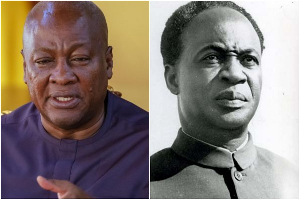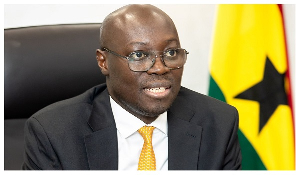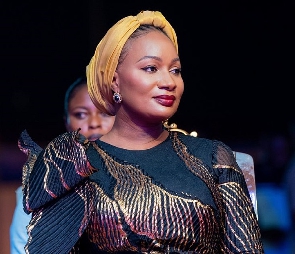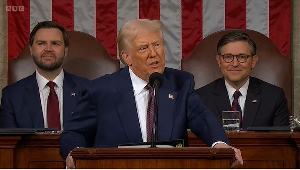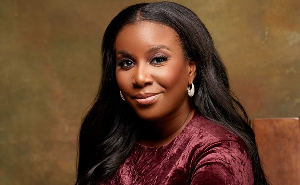- part 1
The new model of CAF's World Cup qualifiers has pitched Ghana against Egypt. For some reason, there is a major cause of concern for all Ghanaians. This is because Ghana appears to be in an unfavourable position, and our quest for a third appearance in the World Cup has come under threat. There are three main reasons why this threat is real. First of all, Ghana is particularly bad in play-offs. In the 1990s when Ghana attempted to make World Cup appearances, Ghana was eliminated by North African teams, namely Algeria (1993) and Morocco (1997). Secondly, Ghana has a not-too-good record against Egypt. And this is evident by the fact that Egypt has won most of the matches the two countries have played. Ghana lost the most recent competitive match against Egypt in the 2010 AFCON Finals. Thirdly, the arrangements are quite problematic since Ghana will play at home first before going away to face Egypt.
Although these facts appear to be a challenge, Ghana could turn around the challenges and convert them to stepping stones. For several reasons, Ghana ought to do everything possible to win this tie. The most prominent reason is the fact that Ghana's soccer development stands to be discontinued if Ghana fails to qualify for the World Cup. To this end, I will use this article to call all Ghanaian stakeholders to arms in working together to beat Egypt to qualify decisively for the World Cup. For this reason, I will recommend that all Ghanaians come together and put behind all our differences to work hard to contribute to the victory we need to appear in Brazil 2014.
URGENT ISSUES
One of the biggest challenges Ghana has is our momentary loss in concentration during tough games. For the past two decades, Ghana always concedes when our defenders lose concentration for a short period and our opponents take advantage of it. This usually happens when our defenders appear petrified and watch the opponents advance through the defense. A textbook example is the case of the most recent match between Ghana and Zambia where our defenders left about four Zambians outside the penalty box unmarked. This led to a goal which threatened to engineer a Zambian comeback in the last 20 minutes of the game. If we cast our minds back, a similar incident occurred in Morocco in 1997 when the Ghanaian defenders lost sight of Moustafa Haji and allowed the unmarked striker to connect with a cross which led to a lone goal which caused our elimination from the qualifiers. This is an issue that needs urgent attention. It all boils down to the proper organization of Ghana's defense and the commitment of our defenders to deal with all issues.
The second issue relates to Ghana having to play away from home in the final match of the play-offs. That proves to be problematic. I remember 1993 where the Ghanaians complained bitterly that the Algerians poured water on their pitch to give them an unfair advantage. I also remember a goalkeeper who stated that the Algerian fans in the stadium had torch lights that they shone on his face whenever the opponents were attacking. Well, this seem to be along the lines of what Zambian fans are busy protesting about after their loss in Kumasi. They claim they were attacked, harassed and forced to train on a car park. Although Ghana's excuses might have been true, they were not sufficient to take us through or lead to a rematch. It is almost certain that Zambia cannot get a rematch against Ghana for their flimsy excuses. Hence, the onus is on the GFA and the Black Stars technical team to find solutions to problems before they come up in our away fixture in this tie. Mind you, in 1993, the same Algerian team was beaten by Nigeria a few weeks after Ghana lost to them. So we need to find solutions to problems that we may face in Egypt and deal with them now. Notable amongst them is the issue of security which we need to question early and monitor closely.
The third matter relates to familiarity. It appears that Ghanaian players are known and quite easy to be predicted and analyzed. Hence, there is the need for some degree of dynamism in the way we play. For instance, everyone knows Gyan. And everyone knows Essien, Ayew, Boateng and most of our top players. In that case, there might be a reason to shuffle some roles in the team to enhance our reputation.
The fourth urgent item is an issue that most people might not want to discuss. However, being a Ghanaian and an African, I think we need to be open about it although I know I will risk being ridiculed by my countrymen. This relates to spirituality. If we cast our minds back, we will remember that Egypt was such a mundane side between 1990 and 2005. The mention of Egypt did not bring any kind of fear to anyone. We all wrote off their 1998 victory in the AFCON as nothing more than a fluke (similar to what Zambia achieved in 2012). In 2006, when Egypt played Senegal, it was obvious that Senegal would beat Egypt. However, after a swift substitution by Hassan Shehata which saw Mido brought out for Amir Zaki, the whole game changed and Zaki got the goal necessary to take Egypt through. After that game, the fortunes of Egypt changed for five long years.
Now, let us examine the man behind all those changes, Hassan Shehata. He is affectionately called “El Me'allim”. This is somewhat similar to what the Hausa/Fula people will call Mallam. Although, in strict Orthodox Islam, a Mualim/Mallam is a scholar who knows much about the Quran, there seem to be an air of mysticism attached to such individuals. They seem to have the ability to examine things in an esoteric manner. Of course, Bob Bradley is not on the same level as Hassan Shehata. And many of the players in the current Egyptian squad can best be described as secular Egyptians. However, we need to recognize the importance of faith and mysticism in this encounter. Although I will not encourage people to live their lives in a superstitious manner, it pays to be sensitive to spiritual matters and avoid things that can potentially bring issues and matters. In that wise, I will encourage the rest of the team to take counsel from some of the players in the squad who are familiar with the role of spirituality in football in the Middle East and North Africa (MENA).
To Be Continued....
Kwabena Owusu
Academic and Strategist
Johannesburg
South Africa
kwabenaowusu2000@gmail.com
BRAZIL 2014: IT IS A DO OR DIE AFFAIR FOR GHANA – PART II
As stated earlier in the series of articles, Ghana will need to put aside all the past issues and past matters and deal with this game as a matter of national interest. We should not deal with the game as a destructive conflict that honours individual egos. To this end, I believe some players are essential, whilst other players could be excused at the moment until the final selection for the World Cup.
Ghana will need to prioritize and select some key players and use them in the play-offs. Also, there are some sensitive positions in the team that has technical hitches and need to be re-addressed. There are two players that I will personally recommend in this encounter, they are Richard Kingston who has experience playing in Turkey for many years and Jerry Akaminko who is currently playing in the Turkish League. I will explain the reason for taking this position later in this article and during my discussion on player selection so kindly bear with me for now.
The Egyptian team has a very weak midfield. In their matches against Guinea, Zimbabwe and Mozambique, it appeared that their midfielders were exceptionally poor. On the other hand, the Egyptians are gifted with two things: speed and accuracy in passing. They give very accurate passes which can find their players in the penalty box. Such players make the best use of the ball in the box. An examination of Egyptian matches will indicate that most of the goals they scored were by a swift run from the centre line which resulted in a good pass that went unnoticed by their opponents' defenders. These passes reached an Egyptian in the opponents' penalty box and the Egyptian gave a very accurate shot into the post. And this is where we need variations.
First of all we need alert defenders who will fight for 50-50 balls and aerial balls. We need fast players to tackle the opponents and we need defenders who will tackle the opponents right inside the penalty box. We must not give anyone a chance in any of the two encounters.
On the other side, we will need to have strikers who will be fast and optimize opportunities. Our build-up is crucial. Against Zambia, most of our clearances from defense were made without any considerations. If you waste such balls against Egypt, they will surely punish you. We will need to build up professionally from defense to the midfield, launch an offense and if it is done swiftly, we can catch the Egyptians on the break. The swiftness of our forwardline on the day is essential and crucial.
Recovery from attack is also essential. Thus, the defense must be highly organized and alert for 90 minutes. There must be no lapses on the matchday. Our build-ups must be swift and our strikers must be fast to take chances. There should be no relaxation at any point, even if we are fortunate to go up by two goals at any point in the game. The Egyptians will want a scoring draw in Kumasi and a win in Egypt. We have to avoid that. We will need a win in Kumasi and fight for a scoring draw or a win in Egypt, in the face of all forms of intimidation. It will not be adviseable to get a totally defensive in any of the encounters. We need our traditional kind of game, the Catenaccio we used in the two World Cups but have a mindset of scoring and winning in both encounters.
PLAYER SELECTION
Our choice of players is also very crucial and central to success. In each of the two World Cups Ghana has been to, we used no less than 40 different players in all the matches that were played. In the current series, save for Harrison Afful and John Boye, there have been changes in all the positions in the team. This implies that there are at least 25 distinct players used. And since the team is opened to all Ghanaians, we have to cast our nets wide and give particular emphasis to players who have experience playing in certain regions of the World. For instance, we saw Solomon Asante playing for an unusually long period of time when Ghana met Burkina Faso in the AFCON. He played in Burkina Faso for some time and nearly naturalized as a Burkinabe player. Frank Acheampong also started against Japan and this is due to the fact that he played in Thailand for some time and was familiar with their style of play.
On the basis of this argument, I think there is a logical case for the inclusion of two players who have knowledge of football in the Middle East and Southern European region, these are Richard Kingston and Jerry Akaminko.
Richard Kingston holds Ghanaian and Turkish nationalities. Kingston played in Turkey for a very long time and has an experience dealing with players with Turkish and other Arab players. So far Fatau Dauda has proven to be a good goalkeeper. However, as the reserve goalkeeper at Orlando Pirates, little can be said about his progress and advancement over the past six-or-so months. The South African league is not so different from the Ghanaian premier league, except for the fact that wages are far higher than they are in Ghana. Nonetheless, staying on the bench does not help Dauda that much. In that case, there is no convincing argument to keep him as Number 1 in a match that is as crucial as this. Kingston is back in a good form and is playing for Doxa Katokopias F.C in Cyprus. He has the honour of wearing the Number 1 jersey for the club which is dominated by Portuguese, Brazilian and Spanish players. With his experience in Turkey, it appears that Kingston has a better advantage than Dauda.
On the other hand, it must be pointed out that Kingston has not shown major limitations in penalty shootouts. In the match against Uruguay, it was surprising that he could not even get the right direction for any of the penalties taken by the South Americans. The same issue applies to Fatau Dauda who was not very convincing in the shootouts with Burkina Faso. Hence, Kwarasey seems to be an appropriate substitute to take over if evidence indicates that the game could be settled by a penalty shootout.
Another important player who deserves to be in the current squad is Jerry Akaminko. Jerry has shown to be a consistent player since his days as captain in Heart of Lions. I find it unfortunate that his hard work and desire to impress led to that penalty in the AFCON game against Congo. Quite frankly, I think the problem was due to a weak defensive midfield that was not playing its role as it was supposed to. The use of Derek Boateng as a defensive midfielder has come at extremely high costs for the Black Stars over the past two years. Derek is an excellent player. However, we all know him as a striker and a midfielder who played behind the strikers from his secondary school days. Using him in defensive midfield always proved to be problematic in the Black Stars over the past two years. And any time Rabiu was used in his stead, the Black Stars did tremendously well. In the match against Burkina Faso, the moment Derek was brought in, the same problem that caused Jerry to concede that penalty surfaced. We all saw an episode that appeared to be penalty on two occasions. One appeared to be a foul caused by Kwadwo Asamoah and the other was caused by John Boye against Traore. It was just due to the exposure caused by the technical lapses of using Derek Boateng in defensive midfield. Boateng is a high quality player who has spent all his life striking. So using him in defensive midfield was putting a square peg in a round hole. And on that account, I think no one should hold anything against Jerry Akaminko.
At this juncture, there is a real case for the search for a defender in the right-back position. Opare is a great player. However, he has a lot of lapses that were exposed in the match against Zambia. He was lucky to run away with just one yellow card due to how hard his tackles appear to be. As a matter of fact, he should be lucky he got just a yellow card in that game. He could have gotten a red card and one of his tackles nearly resulted in a penalty. Inkoom is clubless at the moment. And it appears that using him might be problematic. Hence, it is quite disturbing to go into a crucial match against Egypt with one right-back who is already on a yellow card. This leaves us with two options. One option is to use Essien in the right-back position as Murinho used to do. Another option is to call on Jerry Akaminko who plays in the right side of defense in Eski?ehirspor. This is Jerry's sixth season in Turkey. And he plays virtually all games. He is fast and he is fit. So in the Egyptian challenge, it appears that Jerry is a much better option than Opare or Inkoom. And playing in an Islamic nation like Turkey, he has a familiarity of a terrain that would prove to be an advantage in the match against Egypt.
To Be Continued.....
Kwabena Owusu
Academic and Strategist
Johannesburg
South Africa
kwabenaowusu2000@gmail.com
BRAZIL 2014: IT IS A DO OR DIE AFFAIR FOR GHANA – PART III
After doing all the analysis of the dominant issues in Ghana's major encounter against Egypt, this article comes in as the final piece in the series. In this article, I will examine the different positions and slots in the team and critique each of the roles in the team.
? Goalkeeper: I will recommend the return of Richard Kingston to the squad. I prefer him over the others because of his ability to organize the defense and get players to take up their roles at all time. Kingston has a vast wealth of experience playing in another Islamic country, Turkey. Hence, it will be appropriate to call him back to assist the team. Dauda is lacking playing time in a league that is not very different from the Ghanaian league. However, in the unlikely event of a penalty shootout, my choice will be Adam Kwarasey who is ahead of his colleagues in penalties.
? Right-Back: Egypt's build-up will be from the right side. Aboutreika and Mohammed Salah are two players who often break through the right side of their opponents' defense. I strongly recommend the recall of Jerry Akaminko for two reasons. First of all, he plays in the right back of defense and he is very fit, sharp and has a very good recovery rate. Secondly, like Richard Kingston, Jerry is familiar with the Islamic world and will prove to be a very formidable option rather than the European based players in the right-back position. Moreover, Opare had many issues against Zambia and he is on a yellow card now. Inkoom is clubless. Essien could switch roles with Jerry Akaminko to avoid monotony and prevent the game from being read easily by our opponents. I must however confess that I was not insupport of using the talented Essien in right-back during the early days of Jose Murinho in Chelsea. I will accept such a moderate switch from time to time in a match.
? Left-Back: The left hand side is another dangerous area for Egyptian encroachment. Harrison Afful is the undisputed choice for that role. Afful has learnt so much over the past five years and he is the best in the role. Recounting the sad event that befell Cape Verde, we need to be aware without forgetting that he is on a second yellow card and is not eligible for participation in the first leg of the Egypt encounter. Hence, we will need a replacement. In that case, I will strongly recommend the use of Kwadwo Asamoah who is an excellent defender and in-line to become the next Paolo Maldini for Juventus. I will back the choice of Kwadwo Asamoah in the defensive left-back and also encourage regular overlaps from this talented chap during the match as he did against Congo in the AFCON.
? Centre-Back 1: John Boye is the undisputed replacement for John Mensah. I guess the John-to-John thing is recurring in the Black Stars defense as well.
? Centre-Back 2: Jonathan Mensah is a great player for the role. He is a gifted and talented player who plays this role so well. However, against Zambia, he appeared to be a bit jittery. Some analysts have attributed it to the lack of playing time at Evian. On the other hand, I think he was not given the right directions on how to blend with the team and how to mark the opponents. Looking at the short time available for training, this could be the case. I will advocate for a blend of the roles of Jonathan Mensah with Rabiu Mohammed who could handle that position with the right understanding with John Boye. So when it becomes necessary, Rabiu could be fielded alongside Essien to cover up the defense of Ghana. Another excellent option is to use Jerry Akaminko, in this role. After all, he has was paired with John Boye in this position for many years.
? Defensive Midfield: This is traditionally the role of Michael Essien. In his absence though, Rabiu Mohammed has evolved as the best option for the team. I will therefore advocate for either a partnership between Rabiu and Essien at the expense of Jonathan Mensah or a rotation by Essien and Rabiu. Alternatively, Essien could switch roles and go to the right-back position for Rabiu to handle the defensive midfield. I must point out that this is an option that I have never endorsed since the early years of Jose Murinho in Chelsea.
? Left Attacking Midfield: This is the normal role of Dede Ayew. However, the exceptional Dede Ayew we saw in the World Cup has not been himself after he scored the winner between Ghana and Tunisia in AFCON 2012. He has not been seen much after that episode. That notwithstanding, Ayew is an essential player in the team, but he seem to have gone through a series of misfortunes over the past few months. This is a position that Ayew might have to rotate with Agyeman-Badu for this serious encounter.
? Right Attacking Midfield: This is a role that is best played by Kevin-Prince Boateng. However, with his inability to play on the rough Kumasi pitch, it might not be a bad idea to get him to allow Warris to take over from him. In the return leg, Boateng would be the first choice since the Egyptian pitches are of a relatively higher quality than the Ghanaian pitches. Boateng's advances in the opponents' half would be crucial in preventing Egypt from turning back the pressure on the Stars. Alternatively, Rabiu could take over the defensive midfield role from Essien and Essien can move further to take up this role as he did in the 2006 World Cup qualifiers.
? Left Winger: This is a position that must be left for Sulley Muntari. After being excused for a while to consolidate his place in AC Milan, this is time to bring him back. Wakaso can provide the much needed assistance.
? Right Winger: This is a role that could be played by several players in the current squad. Although Kevin-Prince Boateng is one of the most obvious choices [as he was quite effective in this role in AC Milan], it is still doubtful if he can play so well on the Kumasi turf. This leaves the role open to Agyeman-Badu and Christian Atsu.
? Striker: Asamoah Gyan, the captain will have to take up his role as the striker since Ghana is playing against an opposition he is familiar with.
I trust that this piece will give our technical team some important clues to analyze the options we have and come up with the right suggestions that will stop the fast-paced and accurate Egyptians from bypassing us. Already, they seem to be celebrating their qualification to Brazil. However, I am sure we will get there if we make use of the rich human resource that we have.
Let us all spend time to pray for the Black Stars. As Ghanaians at home and in the Diaspora, the Black Stars provides a lot of joy and connection to the motherland. So let us all do what we can do in our own small way and offer constructive suggestions. Although the technical team might not agree with us all the time, we have to say what we believe to be right after careful consideration and hope for the best.
Kwabena Owusu
Academic and Strategist
Johannesburg
South Africa
kwabenaowusu2000@gmail.com
Sports Features of Friday, 20 September 2013
Source: Kwabena Owusu






